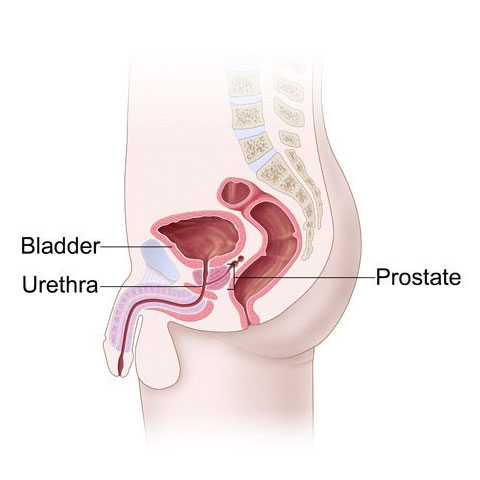Benign Prostatic Hyperplasia (BPH) is a localized enlargement of the prostate gland in aging adult men. It affects approximately 50% of men over the age of 50, and up to 90% of men over 801. This excess growth of tissue compresses and obstructs the urethra, reducing the flow of urine from the bladder and sometimes blocking it entirely. As the symptoms increase, they can greatly impact a man’s quality of life.
It is not currently known why the prostate continues to grow for the majority of men beyond middle age; however, over time, this enlargement often pushes in on the urethra, which will eventually reduce the flow of urine. Patients also feel the need to go to the bathroom more often or feel like their bladder is not fully emptying. Over time, if not treated, the bladder will become thickened as it tries to force the urine through the urethra, which may make it less flexible and more irritable. It is important to talk to your urologist and try to resolve your BPH before this occurs as it may become more difficult over time to reverse the symptoms you are experiencing.
Our team of expert consultants have been involved with bringing Rezum into the UK from the beginning and here they explain how BPH occurs in men and what the symptoms can include.

The following lower urinary tract symptoms (LUTS) may occur as a result of BPH2:
- Need to urinate frequently both day and night
- Weak or slow stream
- Feeling that bladder is not emptying completely
- A stream that starts and stops
- Urgency to urinate
- Difficult or slow start to urination
- Occasional loss of control of urine flow
Some Potential Quality of Life Impacts2:
- Need to restrict/limit fluid intake
- Tired from lack of sleep
- Anxiety or embarrassment
- Challenges with sex life
- Limits activities such as travel, sports, etc.
If you're suffering with any of these symptoms, you can complete this test to help you understand your symptoms and what the next steps are. Take the test here
Treatments for BPH
The initial treatment for BPH is a choice of medications taken daily. However if the symptoms from BPH are relatively severe or unresponsive to medication, then the next step is to consider procedures that aim to create as wide a passage as possible though the prostate gland.
The traditional treatment offered is a TURP (Trans Urethral resection of the prostate). Whilst this surgery option has proven successful in relieving BPH symptoms, it comes with a longer stay in hospital and longer recovery period, in addition to possible side affects on a man’s sexual health.
Minimally invasive treatments for BPH have now stepped up and are also proving to have results that match TURP.
Rezum is adding to the list of BPH treatments alongside Urolift and Greenlight Laser. These treatments are safer and far less invasive then TURP. Make sure to see the results for Rezum’s pivotal crossover study.
References
1 Berry, SJ et al. The development of benign prostatic hyperplasia with age. J Urology. 1984; 132: 474-479
2 Kirby, Roger. Prostate Diseases and Their Treatments, 3rd edition. Health Press 2010.